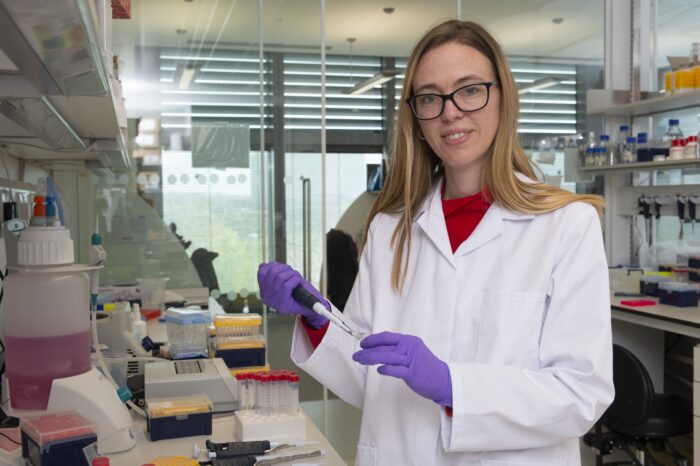
Madeline Lancaster, Group Leader in the LMB’s Cell Biology Division, has been announced as the 2023 recipient of the Cheryll Tickle Medal from the British Society for Developmental Biology (BSDB) in recognition of her pioneering research in the field of human brain development using cerebral organoids.
Madeline commented, “It is truly an honour to be chosen for the Cheryll Tickle Medal and a real testament to the brilliant members of my lab over the past several years. This is well-deserved recognition of all their hard work and dedication.”
The BSDB traces its origins to a February 1948 meeting of 13 researchers who founded the London Embryologists’ Club. Today, the organisation is committed to the advancement of research and teaching of animal and plant biology as it relates to developmental processes, furthering public education and bringing together scientists interested in developmental biology. It has awarded the Cheryll Tickle Medal annually since 2016 to women scientists who have started their research groups in the previous 15 years and made significant contributions to developmental biology research.
The Cheryll Tickle Medal is given in honour of Cheryll Tickle, an eminent researcher who has made significant contributions to the understanding of embryonic development, most notably in her studies on limb development. Recipients receive a medal designed by Andreas Prokop and Megan Davey, and are invited to deliver the Cheryll Tickle Award Lecture at the annual BSDB Spring meeting.
Madeline’s research is focused on understanding how the human brain develops, using cerebral organoids generated from stem cells to model the complex process in vitro. Her group have used these organoids to determine why human brains are comparatively large next to other mammalian species. Additional research topics include the cellular mechanisms underlying uniquely human neurodevelopmental disorders, such as autism and intellectual disability. During the COVID-19 pandemic, Madeline’s group demonstrated a further application of brain organoids, investigating how the SARS-CoV-2 virus infects brain cells, which may contribute to long-term neurological complications.
Before joining the LMB in 2015, Madeline was a postdoctoral researcher at the Institute of Molecular Biotechnology of the Austrian Academy of Sciences (IMBA) in Vienna, Austria, where she first developed brain organoids as a way to study neural development. Prior to this, she earned an undergraduate degree in Biochemistry for Occidental College in Los Angeles, US and a PhD in Biomedical Sciences from the University of California, San Diego, US.
Previous winners of the Cheryll Tickle Medal include LMB alumnae Bénédicte Sanson, who completed a postdoc in the LMB’s Cell Biology Division where she studied Drosophila developmental genetics.
Further references
Madeline’s group page
BSDB Cheryll Tickle Medal Winner: Madeline Lancaster
BSDB Cheryll Tickle Award Lecture